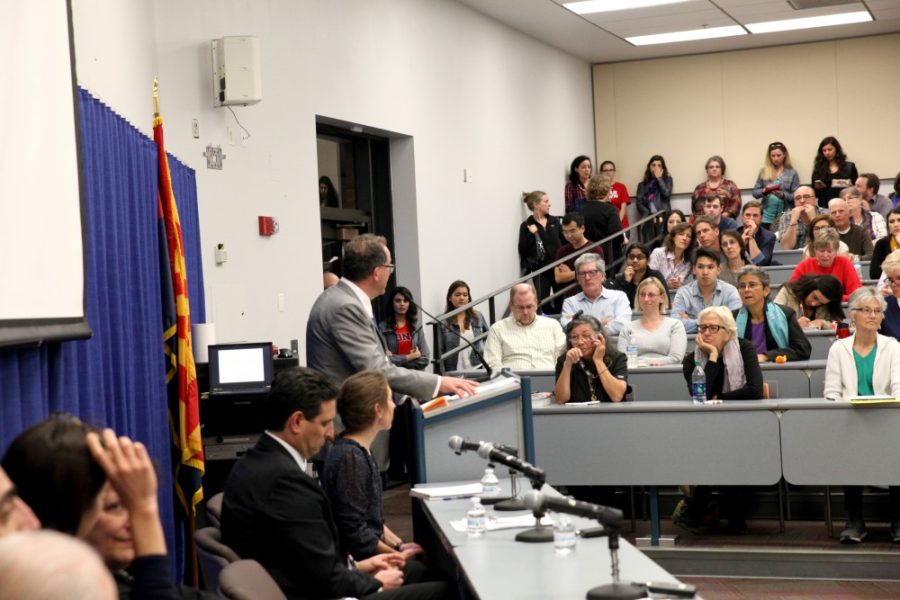In the wake of mass confusion and conflicting government actions after President Donald Trump’s recent executive orders regarding immigration and refugees, UA’s James E. Rogers College of Law hosted a forum on President Trump’s executive orders on Wednesday, Feb. 8.
The United States Ninth Circuit Court of Appeals unanimously ruled to not reinstate President Trump’s travel ban on Thursday, Feb 9. Trump tweeted he plans to appeal their decision shorty after. The Ninth Circuit also ruled, in a 2 to 1 decision, that immigrants cited for expedited removal—a program Trump vows to expand beyond its current enforcement—do not have the right to a lawyer or trial.
Organizers distributed simultaneous interpretation headsets for Spanish speakers and opened two overflow rooms after the original auditorium reached capacity.
“I have never ever seen anything, in the 45 years I have been doing this, like this groundswell of despair, anger and outrage,” said Roxana Bacon, former top counsel for U.S. Citizenship and Immigration Services, when characterizing the worldwide reaction to Trump’s immigration executive orders.
Courts around the nation continue to rule on the legal enforcement of Trump’s orders—the most recent of which coming Thursday afternoon, with a federal appeals court striking down Trump’s most recent effort to revive the ban—creating an ever-shifting field of information.
RELATED: Definitions of humanity: Pouye Khoshkoo describes life after Trump’s immigration ban

Tarik Sultan, an immigration lawyer based in Tucson, briefed the audience on Trump’s now frozen executive order banning refugees for 120 days, Syrians indefinitely and visas for nationals from seven Muslim-majority countries for 90 days.
“With foreign policy, perception is reality and regardless of how surgical the administration says this executive order is, it is perceived as a Muslim ban around the world by our enemies and friends,” Sultan said.
Sultan told the crowd the details of one of his affected cases. A U.S. Army veteran who served in Iraq returned to the Middle East as an author and fell in love with a Persian man.
Currently, they are trapped in Oman because the U.S. will not issue him a visa for the United States and they cannot go to Iran because, in retaliation to Trump’s actions, U.S. citizens cannot enter that country.
The executive order allows the president to extend the time intervals found in the ban.
“We don’t view this as a 90-day travel ban, we view it as an indefinite ban,” Sultan said.
The ban is counterproductive to its aims and will increase anti-American sentiment around the world, immediately impact humanitarian efforts and negatively impact our national economy as well as international reputation, according to a State Department dissent memo Sultan shared.
Nina Rabin, a law professor at the UA, introduced Trump’s executive order, which is characterized by the administration as aimed at increasing safety inside of the U.S.
“President Trump is trying to link undocumented immigrants with fears of public threats and fears about criminality,” Rabin said.
RELATED: Tucson community protests Trump’s immigration ban

According to Congressional research reports, Rabin said, the vast majority of undocumented immigrants are not criminals.
Trump’s executive order increases the number of Immigration and Customs Enforcement agents, creates an office to regularly report crimes committed by illegal aliens and withdraws grant money from sanctuary cities at the discretion of the Secretary of Homeland Security.
Programs which allowed state police officers to carry out the duties of immigration and border patrol agents and created databases to issue automatic detaining orders for arrested undocumented immigrants were walked back under the Obama administration but are expanded under this order, Rabin said.
The orders also prioritize the deportation of immigrants who have committed criminal acts regardless of if they were charged. Since every undocumented migrant crossed the border illegally or remained in the country illegally, this prioritizes every undocumented migrant, Rabin said.
Lynn Marcus, co-director of UA’s Immigration Law Clinic, presented on Trump’s executive order. Beyond directing the building of a wall and detention of all illegal migrants, the order will substantially benefit private prison companies, according to Marcus.
“The executive order directs the use of all available resources to the building of new detention centers at the border with Mexico,” she said.
It currently costs the state $2.3 billion to detain 441,000 individuals a year, and the backlog of initial hearing dates for immigrant cases is three to four years.
Rabin told the crowd the provisions found in Trump’s executive order will not be implemented without huge appropriations from Congress.
“In the expedited removal process, if an immigration officer encounters someone who is suspected of being undocumented, an officer can issue a formal removal order that is not subject to any review,” Marcus said.
If the officer concludes the individual entered the country illegally and cannot prove they have lived in the U.S. for two years, they can be deported without any judicial hearing.
Marcus worries police departments will abuse the powers given to them by the order.
“This is a very ugly time, but you are not as scared if you are prepared,” said Bacon, the former immigrations and citizenship counsel.
Sultan said the government appears to be processing visa applications again and recommended DACA students file renewal paperwork as soon as possible.
Sultan said the administration will attempt to end a visa program providing international students work visas following the completion of a degree, adding to the growing impact on international students at the UA.
Bacon admitted everyone in the room had protest fatigue from the dizzying chaos coming out of the White House. She told the crowd to keep their eye on the ball and talk to their congress members, vote in the midterms and keep fighting back.
Follow Randall Eck on Twitter.









